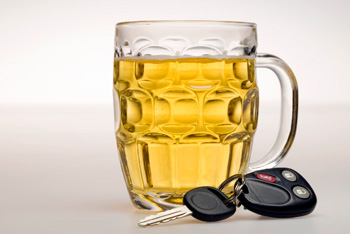May 1, 2013 – According to the Wisconsin Department of Transportation, Wisconsin has the highest rate of drunken driving in the nation.
More than 26 percent of Wisconsin adults who were surveyed admitted that they drove under the influence of alcohol in the previous year.1 There were more than 44,000 convictions for drunken driving offenses in Wisconsin last year.
Alcohol-related crashes killed 238 people in Wisconsin and injured nearly 4,000 in 2009. Approximately, 45 percent of all fatal traffic crashes in Wisconsin in 2009 were alcohol-related; and last year, 40 percent of all fatal motorcycle crashes in Wisconsin were alcohol-related. “No one can seriously dispute the magnitude of the drunken driving problem or the States’ interest in eradicating it.”2
 Marcus J. Berghahn is a shareholder at Hurley, Burish & Stanton S.C. in Madison. His practice concentrates on the defense of individuals accused of misconduct and criminal wrongdoing in state and federal courts, whether at trial or on appeal. He is also an adjunct professor at U.W. Law School, where he teaches a seminar on the Fourth, Fifth, and Sixth amendments to the U.S. Constitution.
Marcus J. Berghahn is a shareholder at Hurley, Burish & Stanton S.C. in Madison. His practice concentrates on the defense of individuals accused of misconduct and criminal wrongdoing in state and federal courts, whether at trial or on appeal. He is also an adjunct professor at U.W. Law School, where he teaches a seminar on the Fourth, Fifth, and Sixth amendments to the U.S. Constitution.
Against this backdrop, news that the U.S. Supreme Court recently required suppression of evidence in a drunk-driving case and affirmed a decision requiring a search warrant before breath or blood evidence could be obtained caused many to take notice.
The Decision and the Impact on Police
The decision, Missouri v. McNeely,3 is noteworthy because the Court rejected a per se rationale that had been used to justify nonconsensual and warrantless seizure of blood (or breath) evidence in drunk-driving cases.
At first reading, McNeely requires police to obtain a search warrant prior to taking an evidentiary breath or blood sample from a suspected drunk driver. This step had not been required before, though it had always been available.
Requiring a search warrant appears to be a significant additional step to the investigation of an all too common law violation. With this gloss, McNeely is a significant decision. Missouri v. McNeely will affect how police investigate drunk drivers.
Police will modify some procedures for judicial authorization before seizing blood evidence.4 But McNeely will not diminish the force of legal tools available to prosecute drunk-driving cases. Only in a small number of cases will McNeely affect whether a drunk-driving prosecution may proceed.5
Indeed, the test used by the U.S. Supreme Court to determine whether the warrantless taking of blood is reasonable remains unchanged: the totality of the circumstances dictates whether the warrantless seizure of evidence is reasonable.6 In the end, that test still allows for the warrantless seizure of evidence of drunk driving; the facts of each case will determine the outcome, legally speaking. That much has not changed.
The Facts in McNeely
Police stopped McNeely for speeding and crossing the centerline of the highway. During their contact with McNeely, police observed signs of intoxication, which were confirmed during his performance of field sobriety tests.
When he declined to take a preliminary breath test, McNeely was arrested and taken to a hospital for an evidentiary blood draw. McNeely refused to consent to having his blood drawn. A sample was taken anyway, and testing showed a blood-alcohol concentration above the legal limit.
 McNeely moved to suppress the results of the blood draw. He argued that the taking of his blood without a judicially authorized warrant violated his rights under the Fourth Amendment to the U.S. Constitution. The trial court agreed.
McNeely moved to suppress the results of the blood draw. He argued that the taking of his blood without a judicially authorized warrant violated his rights under the Fourth Amendment to the U.S. Constitution. The trial court agreed.
So, too, the Missouri Supreme Court, which found the rationale that had been applied for years in drunk-driving cases – dissipation of alcohol creates an exigent circumstance, namely destruction of evidence – was not reasonable here. Missouri appealed to the U.S. Supreme Court.
Issue Revisited
This was not the first time that the U.S. Supreme Court addressed this issue. Already, 45 years ago, in Schmerber v. California, 384 U.S. 757 (1968), the Court upheld as reasonable a warrantless blood test of an individual arrested for drunk driving.
Under the totality of the circumstances, the Schmerber Court concluded, the natural dissipation of alcohol threatened the destruction of evidence, thus justifying the warrantless blood draw.7 But, in McNeely, the record did not lend itself to a similar conclusion. Unrefuted testimony showed that police had time to contact a judge for a search warrant, and there were no “special facts” (such as whether police were delayed by the need to investigate an accident and transport an injured suspect to the hospital).
Missouri argued that dissipation of alcohol justified a categorical exception to the warrant requirement. The U.S. Supreme Court disagreed:
“In short, while the natural dissipation of alcohol in the blood may support a finding of exigency in a specific case, as it did in Schmerber, it does not do so categorically. Whether a warrantless blood test of a drunk-driving suspect is reasonable must be determined case by case based on the totality of the circumstances.”8
Further, the Court noted that the approach urged by Missouri (and many states as amici) would undermine the Fourth Amendment’s warrant requirement.
While the desire for a bright-line rule is understandable, the Fourth Amendment will not tolerate adoption of an overly broad categorical approach that would dilute the warrant requirement in a context where significant privacy interests are at stake.9
The importance of the government’s interest in prosecuting drunk-drivers, however, “does not justify departing from the warrant requirement without showing exigent circumstances that make securing a warrant impractical in a particular case.”10
Conclusion
McNeely is important because it rejected a categorical exception to the Fourth Amendment and emphasized Schmerber’s totality of the circumstances test.11
As a result, Wisconsin’s categorical exception is no longer valid. Thus, McNeely changes how Wisconsin’s trial courts review evidentiary blood draws.
Now, the presence (and, thus natural dissipation) of alcohol, by itself, will not support the finding of exigent circumstances. And, if no search warrant is obtained prior to an evidentiary blood draw, police must demonstrate that the circumstances prevented them from obtaining judicial authorization.
Aside from the police completing additional steps prior to taking an evidentiary blood draw, this means that our circuit courts (judges and court commissioners) will now be called upon, ex ante, to determine whether police have probable cause to believe that a driver’s blood will likely contain evidence of alcohol. While some additional steps may be required, the legal analysis remains the same. The taking of blood be reasonable and must generally comport with the Fourth Amendment’s warrant requirement.
Endnotes
1 See http://www.dot.wisconsin.gov/safety/motorist/drunkdriving (last visited April 22, 2013. “Media reports of alcohol-related death and mutilation on the Nation’s roads are legion. The anecdotal is confirmed by the statistical. “Drunk drivers cause an annual death toll of over 25,000 and in the same time span cause nearly one million personal injuries and more than five billion dollars in property damage.’” Michigan Dep’t of State Police v. Sitz, 496 U.S. 444, 451 (1990).
2 Sitz, 496 U.S. at 451.
3 569 U.S. __ (2013) (decided April 17, 2013).
4 It is already possible for police to obtain search warrants telephonically. Wis. Stat. § 968.12(3).
5 McNeely calls into question whether parts of Wisconsin’s implied consent law, which base the taking of an evidentiary blood draw on less than probable cause that the operator’s blood will contain evidence in cases of significant injury or death is reasonable under the Fourth Amendment. See, e.g., Wis. Stat.. § 345.305(3)(ar)2. In cases of accidents involving great bodily harm or death, police are not required to detect the presence of any alcohol on the operator of a motor vehicle before seeking an evidentiary blood draw (heretofore warrantless); police must only have reason to believe that the operator violated a state or local traffic law including equipment violations. McNeely noted that, “all 50 States have adopted implied consent laws that require motorists, as condition of operating a motor vehicle within the State, to consent to BAC testing if they are arrested or otherwise detained on suspicion of a drunk-driving offense.” Slip Op. at 18. Probable cause thus still remains the touchstone of reasonableness for the drawing of blood under these laws. But see § 345.305(3)(ar)2.
6 Slip op. at 23.
7 The Wisconsin Supreme Court agreed and thus permitted warrantless blood draws when police had probable cause to believe that the operator of a motor vehicle was impaired by alcohol or a restricted controlled substance. State v. Bohling, 173 Wis. 2d 529, 494 N.W.2d 399 (1993); see also Wis. Stat.§ 345.305 (Wisconsin’s Implied Consent law which authorize police to take an evidentiary breath or blood sample on probable cause that the operator of a motor vehicle is impaired by alcohol or a restricted controlled substance). Bohling effectively created a per se exception to the warrant requirement; that is, application of the exigent circumstance (dissipation of alcohol) was not reviewed on a case-by-case basis. As a result, the decision is likely abrogated by McNeely.
8 Slip op. at 13.
9 Id., at 15.
10 Id., at 18.
11 In this regard, Missouri v. McNeely is not unlike Arizona v. Gant, 129 S. Ct. 1710 (2009), in which the Court clarified the extant rule of New York v. Belton, 453 U.S. 454 (1981), relating to searches of cars incident to an arrest.
